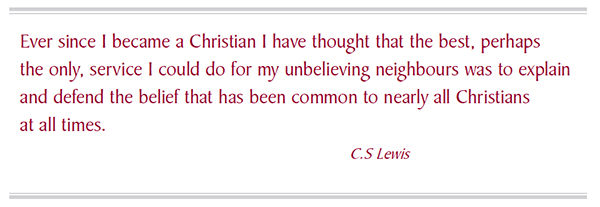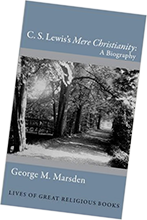Back to series


Recommended Reading:

Download or Listen to Audio
A Biography of Mere Christianity
Click here to open a Print - Friendly PDF
|
A biography of a book may sound like an unusual concept, but books do have their own lives, and some books have shaped the world profoundly. That is especially true of religious books. Recognizing this, the religion editor of Princeton University Press instituted a series called the Lives of Great Religious Books. So far, the volumes include The Book of Genesis, The Book of Job, The Book of Mormon, The Tibetan Book of the Dead, Augustine’s Confessions, Thomas Aquinas’s Summa Theologica, John Calvin’s Institutes, among others published or forthcoming. When I was asked to contribute to this project, I saw C.S. Lewis’s Mere Christianity as an appropriate addition to the series. Even though it is relatively new and is not, like many of the works, an official authoritative text of a religious movement, it has a claim to being one of the most important religious works of the twentieth century.
During the first fifteen years of the twenty-first century, it sold more than 3.5 million copies in English alone. It has been translated into more than thirty languages. I have been told that, next to the Bible, it is the book most likely to have been read by educated Chinese Christians. That is all the more remarkable because what became Mere Christianity was not originally planned as a book. Rather, it began as a brief series of broadcasts on the BBC during England’s dark days in the early part of World War II. Lewis’s presentations were successful enough for the BBC to invite him back for some additional broadcasts. Eventually he offered four such series. He collected and edited the first two series into a little paperback, titled simply Broadcast Talks. These were soon published also in the States with the catchier title The Case for Christianity. Lewis had suddenly become well known for The Screwtape Letters, first published in book form in 1942. During the next couple of years, he published the third and fourth sets of BBC talks, adding a few extra chapters. These he titled Christian Behavior and Beyond Personality. It is not even clear whose idea it was to bring the three small paperbacks together as a single book. But in 1952 Lewis issued them together, lightly edited, and with an important new preface that explained the meaning of his new title: Mere Christianity. The story of the life of Mere Christianity has a number of fascinating dimensions. First, there is the story of its origins. The setting during the trying days of World War II is particularly dramatic, and there is a good bit to say about Lewis’s view of his “war service” as an apologist for traditional Christianity. In addition to the broadcasts, he was traveling on many weekends to RAF camps to talk about Christianity to men whose life expectancies were appallingly short as they faced bombing raids over Germany. These experiences helped furnish Lewis with a good sense of how to communicate with the less educated, a skill that was essential for an Oxford don who wished to reach a wide audience with his broadcasts.
As someone known for smoking and drinking, Lewis did not quite fit the American evangelical mold. Though they liked his supernaturalism and frank gospel message, some were suspicious of a few aspects of his theology. It was only in the decade or so after Lewis’s death in 1963, a time when mainline interest in him was fading, that he emerged as an iconic figure for American evangelicals, eventually standing second only to Billy Graham in their hierarchy of “saints.” One highlight of that story is the conversion of Charles Colson, convicted for involvement in the Watergate conspiracy. Colson’s best-selling book Born Again, emphasizing the role of Mere Christianity in his transformation, appeared in 1976. Since then other conversion narratives, such as that of Francis Collins and multi-millionaire Thomas S. Monaghan, founder of Domino’s Pizza, have added to the reputation of the book. Monaghan was one of many Catholic admirers of Lewis’s work. Lewis also has some distinguished successor apologists who acknowledge the influence of his work. Among these are J.I. Packer, Peter Kreeft (another Catholic), Francis Collins, Alister McGrath, N.T. Wright, John Piper, and Timothy Keller. Not everyone, of course, has liked the book. So another part of the story is the criticisms it has received. Interestingly, the argument that probably more people have found persuasive than any other has also been the most criticized. That is the famous “trilemma”—now popularly phrased that Jesus is either liar, lunatic, or Lord. Though the argument had been around for a long time, it became associated with Lewis. Critics point out that it is not an airtight logical argument, since there may be other explanations, such as that the Gospel writers only later attributed divinity to Jesus. One can, for instance, readily find websites such as “Atheism 101, how to respond to the Liar, Lunatic, or Lord argument.” Lewis was aware that the argument was not airtight. In fact, in his original radio script he alluded to and dismissed the fourth possibility, but he dropped that for the publications, probably thinking the point required more explanation. Despite criticisms, Lewis also has some very able philosophical defenders. And many readers continue to find his arguments compelling. One challenge in writing this “biography” of Mere Christianity was to find a way to go beyond the stories of origins and reception, as interesting as each of those is. So I chose to consider the “life” of the book as also involving its “vitality.” What gives this book its ongoing vitality, contributing to its growth in popularity over the years? What is the genius of this book? The answers are, of course, not original with me. I am in a sense distilling what has been said by many writers who have reflected on Lewis’s marvelous effectiveness as an apologist. Here I’ll just summarize the seven traits I identify as contributing to the book’s genius in the hopes that these will whet the reader’s appetite for more. 1. Lewis looks for timeless truths as opposed to the culturally bound.Lewis is well known for his rejection of “chronological snobbery” or the idea that the latest fashionable ideas are likely to be the best. He maintained, rather, that the beliefs that had lasted the longest were more likely to be true. Perhaps not surprisingly, then, Mere Christianity is not dated in the way most other mid-twentieth-century books seem to be. 2. Lewis uses common human nature as the point of contact with his audiences.As a literary scholar, Lewis looked for what was common in human experience. He combined that expertise with a good ear for listening to his less-educated neighbors or tradespeople. So when it came to speaking on the BBC to just about every sort of person, he knew where to begin—with our common sense that there is a right and a wrong. And unlike what one might expect of a university don, he could speak in simple terms that just about everyone could understand. As in writing the Narnia tales, he knew how to put himself in the shoes of his audience. 3. Lewis uses reason in the context of experience, affections, and the imagination.Some people are reluctant to open Mere Christianity, because they think it is mostly a set of arguments. Lewis was indeed sharp in argument and debate. But he put whatever arguments he presented in the context of first appealing to his audiences’ imagination, longing, and desires. He used reason to remove some of the modern obstacles to belief. But his appeal is to the whole person who intuitively recognizes that there is more to reality than modern culture may allow. Lewis speaks of the disenchantment of the modern world, and one of the things he tries to do is to re-enchant it by, as he says in his sermon “The Weight of Glory,” weaving a spell. 4. He is a poet at heart, using metaphor and the art of meaning in a universe that is alive.Lewis’s first ambition was to be a poet, and he never lost the sensibility that realities are best expressed through images and analogies that awaken the imagination. Mickey Maudlin, the religion editor who oversees Lewis’s publications at HarperOne, has observed that in Mere Christianity, as in his fiction, Lewis invites the reader on an imaginative journey. Similarly, while one might pick up Mere Christianity “because people say it is the best summary of what it means to be a Christian and of what Christians believe,” Maudlin observes that soon you find that it is something more:
These poetic sensibilities underscore the previous point that, while Lewis appeals to the reason, he does so in the context of exciting the imagination. As in the Narnia tales, he invites his readers to see that the narrative of their own lives is set in the midst of a much larger real-life cosmic drama. They are invited to imaginatively see themselves as within a real cosmic drama in which a loving but dangerous God is inviting us to be remade. 5. His subject is “mere” Christianity.This point, which he elaborates in his 1952 preface, is closely related to his deep historical consciousness. By “mere Christianity” he meant the beliefs that Christians through the ages had shared, beliefs that had been around “long before I was born and whether I like it or not.” Contrary to those who thought that Christianity with the disputed points omitted would be only a “vague and bloodless” lowest common denominator, he was confident that the perennial common beliefs were in fact substantial and powerful. The concept of “mere Christianity” as something that binds Christians of all sorts together may have even more resonance in the twenty-first century than it did in Lewis’s time. Today denominational loyalties have weakened, and most Christians are willing, as Lewis urged, to be generous to those in other communions. Protestants and Catholics, for instance, are much more ready to recognize their commonalities than they were two generations ago. And as is illustrated by the various societies that bear his name or the organizations that describe their views as “mere Christian,” C.S. Lewis is one of the hallmarks that Christians of many communions have in common. 6. “Mere Christianity” is not “cheap grace.”“Mere” Christianity is not minimal Christianity. It does not offer “cheap grace,” to use Dietrich Bonhoeffer’s term. It is not easy or “safe.” Rather, readers find that they are being drawn in to an understanding of Christianity that is going to be extraordinarily demanding on them personally. They are being asked to give up their very “self” as a sovereign entity and to experience Christ living in them. “To become new men means losing what we now call ‘ourselves.’ Out of our selves, into Christ, we must go.”2 So part of the appeal of Mere Christianity is that the journey on which Lewis invites readers to join him is fulfilling because it is demanding. 7. Finally, the lasting appeal of Mere Christianity is based on the luminosity of the gospel message itself.In an essay on literary criticism (C.S. Lewis and E.M.W. Tillyard, The Personal Heresy: A Controversy), Lewis observed that the poet should not be inviting the reader to look at the poet, but rather pointing the reader to “look at that.” Lewis succeeds admirably in pointing the reader toward the subject. As others have observed, he does not simply present arguments; rather, he acts more like a friendly companion on a journey. To expand on that image: he is like a companion on a hike who is an expert naturalist and points out all sorts of flora or tiny flowers or rock formations that you would have missed on your own. When you see the wonders, you are duly impressed with your guide as an intermediary, but, particularly if that guide leads you to one of the most astonishing mountain peaks and sights that you have ever seen, the beauty of the objects themselves overwhelms your attention. You are deeply grateful to your guide, but that is not the essence of your unforgettable encounter with that beauty. So Lewis points his audiences toward seeing Christianity not as a set of abstract teachings but, rather, as something that can be experienced and enjoyed as the most basic and the most beautiful of all realities.
|
|||
|
Notes: |
|||
|
|
|||

George Marsden
ProfessorGeorge Marsden, Professor of History Emeritus at University of Notre Dame, is an influential historian who has written extensively on the interaction between Christianity and American culture, particularly on Christianity in American higher education and on American evangelicalism. He is well known for his biography Jonathan Edwards: A Life. He has authored other books including The Soul of the American University, Religion and American Culture, and Fundamentalism and American Culture. His most recent book is C.S. Lewis’s “Mere Christianity”: A Biography. Marsden studied at Haverford College, Westminster Theological Seminary, and Yale University; he has taught at Calvin University, Duke University, and the University of Notre Dame, and is now scholar in residence at Calvin University.

Recommended Reading:
George Marsden, C. S. Lewis’s "Mere Christianity”: A Biography (Lives of Great Religious Books) (Princeton University Press, 2016)
Mere Christianity, C.S. Lewis’s eloquent and winsome defense of the Christian faith, originated as a series of BBC radio talks broadcast during the dark days of World War Two. Here is the story of the extraordinary life and afterlife of this influential and much-beloved book.
 COPYRIGHT: This publication is published by C.S. Lewis Institute; 8001 Braddock Road, Suite 301; Springfield, VA 22151. Portions of the publication may be reproduced for noncommercial, local church or ministry use without prior permission. Electronic copies of the PDF files may be duplicated and transmitted via e-mail for personal and church use. Articles may not be modified without prior written permission of the Institute. For questions, contact the Institute: 703.914.5602 or email us.
COPYRIGHT: This publication is published by C.S. Lewis Institute; 8001 Braddock Road, Suite 301; Springfield, VA 22151. Portions of the publication may be reproduced for noncommercial, local church or ministry use without prior permission. Electronic copies of the PDF files may be duplicated and transmitted via e-mail for personal and church use. Articles may not be modified without prior written permission of the Institute. For questions, contact the Institute: 703.914.5602 or email us.
-
Recent Podcasts
Ralph Waldo Emerson’s Philosophy and Influence
by David George Moore on July 26, 2024Ralph Waldo Emerson was a gifted nineteenth century...Read More
-
The Side B Stories – Nate Sala’s Story
by Jana Harmon, Nate Sala on July 19, 2024
-
Terrorism Through the Eyes of Faith
by Dennis Hollinger on July 12, 2024
-
Recent Publications
Hasn’t Science Proven That Belief in God Is an Outdated Superstition?
by Sharon Dirckx on July 1, 2024Many assume that scientific practice and belief in...Read More
-
Has the Bible Been Corrupted as Some Muslims Claim?
by Andy Bannister on June 1, 2024
-
Seeing Jesus Through the Eyes of Women
by Rebecca McLaughlin on May 15, 2024
0
All Booked
0.00
All Booked
0.00
All Booked
22194
C.S. Lewis’s The Abolition of Man Live Online Small Group 8:00 PM ET
https://www.cslewisinstitute.org/?event=c-s-lewiss-the-abolition-of-man-study-course&event_date=2024-10-02®=1
https://www.paypal.com/cgi-bin/webscr
2024-10-02

Next coming event
Days
Hours
Minutes
Seconds
C.S. Lewis’s The Abolition of Man Live Online Small Group 8:00 PM ET
On October 2, 2024 at 8:00 pmSpeakers

George Marsden
Professor
Team Members

George Marsden
ProfessorGeorge Marsden, Professor of History Emeritus at University of Notre Dame, is an influential historian who has written extensively on the interaction between Christianity and American culture, particularly on Christianity in American higher education and on American evangelicalism. He is well known for his biography Jonathan Edwards: A Life. He has authored other books including The Soul of the American University, Religion and American Culture, and Fundamentalism and American Culture. His most recent book is C.S. Lewis’s “Mere Christianity”: A Biography. Marsden studied at Haverford College, Westminster Theological Seminary, and Yale University; he has taught at Calvin University, Duke University, and the University of Notre Dame, and is now scholar in residence at Calvin University.



 One of the remarkable features of the life of Mere Christianity is that, unlike most other books of its time, it is even more popular today than when it first came out.
One of the remarkable features of the life of Mere Christianity is that, unlike most other books of its time, it is even more popular today than when it first came out. Another significant part of the story has to do with the reception of the book. Lewis’s broadcasts and the original paperbacks served a felt need for many people during the war years. So the publications were, with a few notable exceptions, well received both in Great Britain and the United States. Interestingly, in the States his strongest following was among the more traditionally inclined mainline Protestant denominations than among self-identified fundamentalists or evangelicals.
Another significant part of the story has to do with the reception of the book. Lewis’s broadcasts and the original paperbacks served a felt need for many people during the war years. So the publications were, with a few notable exceptions, well received both in Great Britain and the United States. Interestingly, in the States his strongest following was among the more traditionally inclined mainline Protestant denominations than among self-identified fundamentalists or evangelicals.


